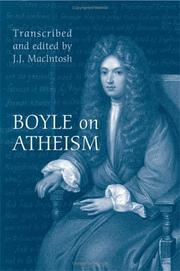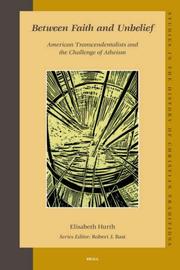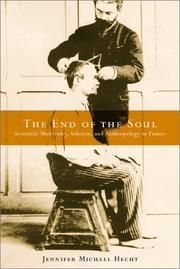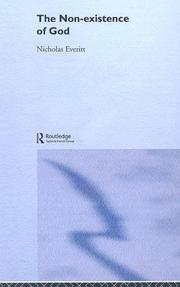| Listing 1 - 7 of 7 |
Sort by
|

ISBN: 0802090184 9780802090188 1281991708 1442671556 9786611991708 Year: 2005 Publisher: Toronto, [Ontario] ; Buffalo, [New York] ; London, [England] : University of Toronto Press,
Abstract | Keywords | Export | Availability | Bookmark
 Loading...
Loading...Choose an application
- Reference Manager
- EndNote
- RefWorks (Direct export to RefWorks)
"With Boyle on Atheism, J.J. MacIntosh has culled the Boyle manuscripts held at the Royal Society Library in London and transcribed the portions that relate to atheism, arranging them in the order Boyle appears to have intended (as outlined in one of the pieces). Included are Boyle's views on the causes (and remedies) of atheism, the nature of God, various possible arguments for God's existence, the excellency of Christianity, and the character of atheists and the deficiencies to be found in their arguments."--Jacket
Atheism --- Athéisme --- History --- Histoire --- Boyle, Robert, --- Atheism. --- God --- Athéisme. --- Dieu --- Proof. --- Existence. --- Religion.

ISBN: 9789004161665 900416166X 9786611936419 1281936413 9047421264 9789047421269 9789047421269 9781281936417 6611936416 Year: 2007 Volume: 136 Publisher: Leiden : Brill,
Abstract | Keywords | Export | Availability | Bookmark
 Loading...
Loading...Choose an application
- Reference Manager
- EndNote
- RefWorks (Direct export to RefWorks)
This book sets out to shed light on what is specific to American Transcendentalism by comparing it with the atheistic vision of German philosophers and theologians like Ludwig Feuerbach and Arthur Schopenhauer. The study argues that atheism was part of the discursive and religious context from which Transcendentalism emerged. Tendencies toward atheism were already inherent in Transcendentalist thought. The atheist scenario came to the surface in the controversy about Emerson’s “new views.” Contemporary critics charged that the deity Emerson worshipped was himself. Emersonian Transcendentalism thus anticipated some of the central concerns in the works of German atheists like Feuerbach. From idealism to atheism seemed but a short step.
Religious studies --- 211 --- God. Opperwezen. Oneindige: deïsme; theïsme; atheïsme --- Transcendentalism (New England) --- Atheism --- Transcendentalism --- Transcendantalisme (Philosophie américaine) --- Athéisme --- Transcendantalisme --- History. --- Philosophy. --- Histoire --- Philosophie --- Philosophy --- Agnosticism --- Free thought --- Irreligion --- Religion --- Secularism --- Theism --- New England transcendentalism
Book
ISBN: 9789004265417 9004265414 9004288163 9789004288164 Year: 2015 Volume: 176 Publisher: Leiden, Netherlands ; Boston, [Massachusetts] : Brill,
Abstract | Keywords | Export | Availability | Bookmark
 Loading...
Loading...Choose an application
- Reference Manager
- EndNote
- RefWorks (Direct export to RefWorks)
Atheists generated widespread anxieties between the Reformation and the Enlightenment. In response to such anxieties a distinct genre of religious apologetics emerged in England between 1580 and 1720. By examining the form and the content of the confutation of atheism, Anti-Atheism in Early Modern England demonstrates the prevalence of patterned assumptions and arguments about who an atheist was and what an atheist was supposed to believe, outlines and analyzes the major arguments against atheists, and traces the important changes and challenges to this apologetic discourse in the early Enlightenment.
Christian apologetics --- Christian church history --- Great Britain --- Apologetics --- Atheism --- Christianity and atheism. --- Apologétique --- Athéisme --- Christianisme et athéisme --- History --- Histoire --- England --- Angleterre --- Church history. --- Histoire religieuse --- History of the United Kingdom and Ireland --- anno 1500-1799 --- Philosophy --- Agnosticism --- Free thought --- Irreligion --- Religion --- Secularism --- Theism --- Atheism and Christianity --- Apologetics, Missionary --- Christian evidences --- Christianity --- Evidences, Christian --- Evidences of Christianity --- Fundamental theology --- Polemics (Theology) --- Theology, Fundamental --- Religious thought --- Theology --- History. --- Evidences

ISBN: 0231502389 0231128460 9780231502382 9780231128469 Year: 2003 Publisher: New York : Columbia University Press,
Abstract | Keywords | Export | Availability | Bookmark
 Loading...
Loading...Choose an application
- Reference Manager
- EndNote
- RefWorks (Direct export to RefWorks)
On October 19, 1876 a group of leading French citizens, both men and women included, joined together to form an unusual group, The Society of Mutual Autopsy, with the aim of proving that souls do not exist. The idea was that, after death, they would dissect one another and (hopefully) show a direct relationship between brain shapes and sizes and the character, abilities and intelligence of individuals. This strange scientific pact, and indeed what we have come to think of as anthropology, which the group's members helped to develop, had its genesis in aggressive, evangelical atheism.With this group as its focus, The End of the Soul is a study of science and atheism in France in late nineteenth and early twentieth centuries. It shows that anthropology grew in the context of an impassioned struggle between the forces of tradition, especially the Catholic faith, and those of a more freethinking modernism, and moreover that it became for many a secular religion. Among the adherents of this new faith discussed here are the novelist Emile Zola, the great statesman Leon Gambetta, the American birth control advocate Margaret Sanger, and Arthur Conan Doyle, whose Sherlock Holmes embodied the triumph of ratiocination over credulity.Boldly argued, full of colorful characters and often bizarre battles over science and faith, this book represents a major contribution to the history of science and European intellectual history.
Atheism --- Religion and science --- Anthropology --- Rationalism --- Religion --- Philosophy & Religion --- History --- History. --- France --- Religion. --- -Atheism --- -Religion and science --- -Christianity and science --- Geology --- Geology and religion --- Science --- Science and religion --- Philosophy --- Agnosticism --- Free thought --- Irreligion --- Secularism --- Theism --- Human beings --- Religious aspects --- Soul --- Athéisme --- Religion et sciences --- Anthropologie --- Ame --- Histoire --- Church history --- Histoire religieuse --- Christianity and science --- Primitive societies --- Social sciences

ISBN: 0415301068 0415301076 1280075414 020364378X 113441899X 9780203643785 9780415301060 9780415301077 9781280075414 9781134418992 9781134418947 1134418949 9781134418985 1134418981 0889469059 Year: 2004 Volume: 1. Publisher: London : Routledge,
Abstract | Keywords | Export | Availability | Bookmark
 Loading...
Loading...Choose an application
- Reference Manager
- EndNote
- RefWorks (Direct export to RefWorks)
A series of essays on aspects of Tillich's thought considered to be representative of more fundamental problems endemic to Christian theology. The author argues that Tillich's thought is actually closer to traditional Christian thought, especially that of Thomas Aquinas.
Atheism. --- Faith and reason. --- God --- Proof. --- Tillich, Paul. --- Aquinas, Thomas. --- Faith and logic --- Logic and faith --- Reason --- Reason and faith --- Reason and religion --- Religion and reason --- Religious aspects --- -Proof --- Philosophy --- Agnosticism --- Free thought --- Irreligion --- Religion --- Secularism --- Theism --- Athéisme --- Dieu --- Foi et raison --- Existence --- Atheism --- Faith and reason --- Proof
Book
ISBN: 0826444296 9780826444295 0826446299 9780826446299 1472542835 9786613272041 1283272040 1441157921 9781441157928 9781472542830 9781283272049 6613272043 9781441110725 1441110720 Year: 2010 Publisher: London New York Continuum
Abstract | Keywords | Export | Availability | Bookmark
 Loading...
Loading...Choose an application
- Reference Manager
- EndNote
- RefWorks (Direct export to RefWorks)
"The New Atheist Novel is the first study of a major new genre of contemporary fiction. It examines how Richard Dawkins's so-called 'New Atheism' movement has caught the imagination of four eminent modern novelists: Ian McEwan, Martin Amis, Salman Rushdie and Philip Pullman. For McEwan and his contemporaries, the contemporary novel represents a new front in the ideological war against religion, religious fundamentalism and, after 9/11, religious terror: the novel apparently stands for everything - freedom, individuality, rationality and even a secular experience of the transcendental - that religion seeks to overthrow. In this book, Bradley and Tate offer a genealogy of the New Atheist Novel: where it comes from, what needs it serves and, most importantly, where it may go in the future. What is it? How does it dramatise the war between belief and non-belief? To what extent does it represent a genuine ideological alternative to the religious imaginary or does it merely repeat it in secularised form? This fascinating study offers an incisive critique of this contemporary testament of literary belief and unbelief."--Bloomsbury Publishing The New Atheist Novel is the first study of a major new genre of contemporary fiction. It examines how Richard Dawkins's so-called 'New Atheism' movement has caught the imagination of four eminent modern novelists: Ian McEwan, Martin Amis, Salman Rushdie and Philip Pullman. For McEwan and his contemporaries, the contemporary novel represents a new front in the ideological war against religion, religious fundamentalism and, after 9/11, religious terror: the novel apparently stands for everything - freedom, individuality, rationality and even a secular experience of the transcendental - that religion seeks to overthrow. In this book, Bradley and Tate offer a genealogy of the New Atheist Novel: where it comes from, what needs it serves and, most importantly, where it may go in the future. What is it? How does it dramatise the war between belief and non-belief? To what extent does it represent a genuine ideological alternative to the religious imaginary or does it merely repeat it in secularised form? This fascinating study offers an incisive critique of this contemporary testament of literary belief and unbelief.
Religion and literature. --- Atheism and literature. --- English fiction --- History and criticism --- McEwan, Ian --- Amis, Martin --- Rushdie, Salman --- Pullman, Philip, --- Criticism and interpretation. --- Religion and literature --- History and criticism. --- Literature and atheism --- Literature --- Literature and religion --- Moral and religious aspects --- McEwan, Ian (1948-....) --- Amis, Martin (1949-....) --- Rushdie, Salman (1947-....) --- Pullman, Philip (1946-....) --- Religion et littérature --- Athéisme --- Littérature anglophone --- Critique et interprétation --- Dans la littérature --- 21e siècle --- Religion et littérature --- Athéisme --- Littérature anglophone --- Critique et interprétation --- Dans la littérature --- 21e siècle
Book
ISBN: 9789031729777 Year: 2010 Publisher: Averbode [Altiora]
Abstract | Keywords | Export | Availability | Bookmark
 Loading...
Loading...Choose an application
- Reference Manager
- EndNote
- RefWorks (Direct export to RefWorks)
Natural theology --- Atheism --- Atheïsme --- Athéisme --- Christianisme et science --- Christianisme et sciences --- Christianity and science --- Geology -- Religious aspects --- Geology and religion --- Godsdienst --- Godsdienst en wetenschap --- Géologie et religion --- Religie --- Religion --- Religion and science --- Religion et science --- Religion et sciences --- Religion et sciences naturelles --- Religion et technologie --- Religions et sciences --- Science -- Religious aspects --- Science and religion --- Science et christianisme --- Science et religion --- Sciences et christianisme --- Sciences et religion --- Sciences et religions --- Sciences naturelles et religion --- Technologie et religion --- Wetenschap en godsdienst --- BPB1005 --- C1 --- atheïsme --- religie --- filosofie --- Extrémisme --- godsdienst --- 239.7 --- #GGSB: Dogmatiek --- #GGSB: Geloof --- #GGSB: Atheisme --- Kerken en religie --- Extremisme --- Apologetica: tegen rationalisten en ongelovigen--(in het algemeen) --- 239.7 Apologetica: tegen rationalisten en ongelovigen--(in het algemeen) --- εξτρεμισμός --- extremism --- ekstremizmas --- ekstrēmisms --- extremismus --- Extremismus --- extremisme --- ekstremizëm --- extremismo --- szélsőség --- ekstremizam --- estremismo --- extrémizmus --- екстремизам --- estremiżmu --- ekstremisme --- ekstremizem --- antoisceachas --- äärisuuntaus --- екстремизъм --- ekstremizm --- äärmuslus --- ekstremism --- fanatism --- φανατισμός --- fanatizëm --- фундаментализам --- fanatismus --- fundamentalismus --- vallási fanatizmus --- fanatismo --- фанатизам --- fanatizmus --- fanatismi --- fanaticism --- kiihkomielisyys --- fanatisme --- fanātisms --- fanatizmas --- Fanatismus --- fanatizam --- fe --- uskonto --- náboženstvo --- vallás --- religión --- religioon --- vjera --- religija --- religione --- reliģija --- religião --- náboženství --- religia --- религија --- reliġjon --- θρησκεία --- religion --- религия --- usutunnistus --- víra --- deismus --- светец --- теизам --- irreligiosità --- religiosità --- zbožnost --- věřící --- религиозност --- religiozita --- teismus --- деизам --- побожност --- světec --- kreacionismus --- panteismus --- Religionsgemeinschaft --- fideismus --- svatý --- vallási közösség --- Glaubensgemeinschaft --- pobožnost --- верници --- вера --- пантеизам --- ateiżmu --- атеизъм --- ateisme --- ateísmo --- ateism --- ateizmus --- ateisms --- ateismus --- атеизам --- ateismo --- αθεϊσμός --- ateizem --- ateizëm --- Atheismus --- ateismi --- ateizmas --- ateizm --- atheism --- ateizam --- безбожност --- bezvěrec --- безверник --- gudsfornægtelse --- атеист --- ateista --- nevěřící --- popírání boha --- rouhačství --- безбожништво --- nevíra v boha --- безверништво --- безбожник --- volnomyšlenkářství --- reiligiún --- aindiachas --- Dogmatiek --- Geloof --- Atheisme --- Extrémisme --- Athéisme
| Listing 1 - 7 of 7 |
Sort by
|

 Search
Search Feedback
Feedback About UniCat
About UniCat  Help
Help News
News